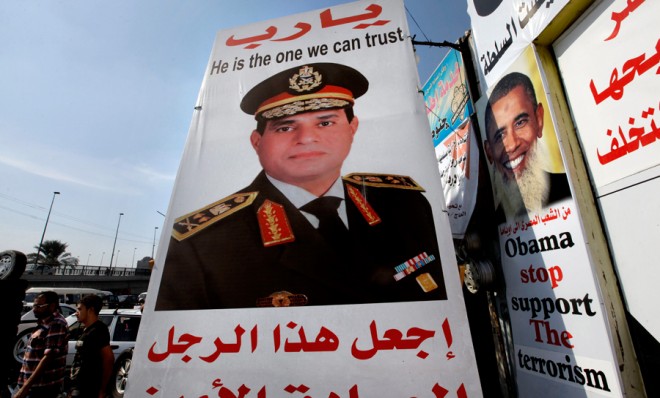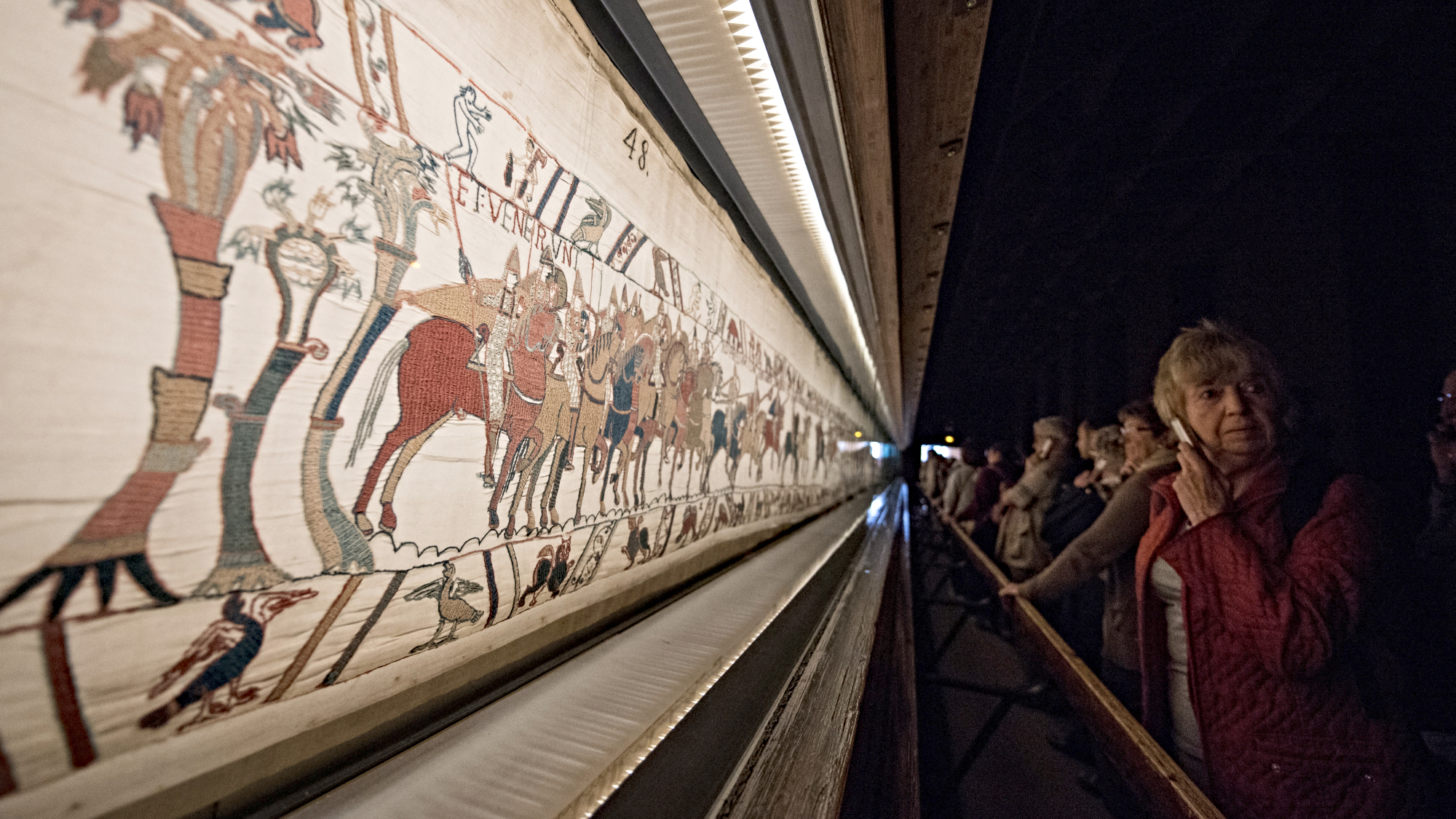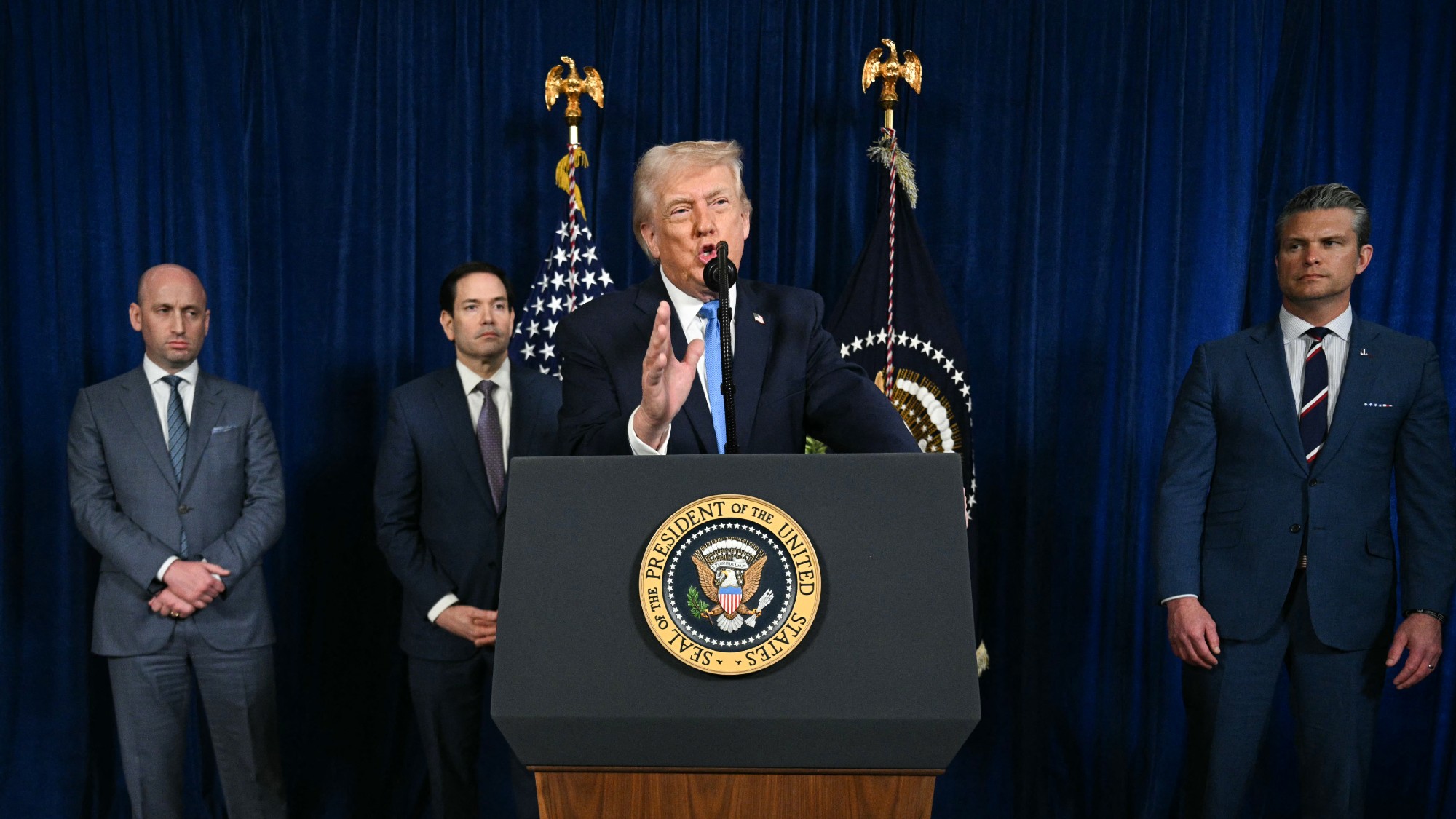Gen. Abdel-Fattah el-Sissi: Egypt's new strongman
The general is riding a wave of adulation in Cairo after ousting President Mohammed Morsi. Who is he?

How popular is el-Sissi?
The cult of personality around Egypt's new leader is immediately apparent in Cairo. Posters of him are everywhere, many of them bearing the slogan "The one we can trust." Charismatic and telegenic, el-Sissi is given to passionate and sentimental speeches about patriotism and the glory of Egypt. Fawning profiles in the Egyptian press routinely portray him as Egypt's savior. Yasser Rizq, respected editor of the independent Al-Masry Al-Youm, called him "calm, cultured, religious, level-headed, articulate, and full of pride for Egyptian nationalism," as well as someone who understood "the true nature of moderate Islam." Even the violent clearing of the Muslim Brotherhood sit-ins, with more than 1,000 people killed, did not diminish the adulation for el-Sissi among his supporters.
Why did Morsi appoint him army chief?
The Week
Escape your echo chamber. Get the facts behind the news, plus analysis from multiple perspectives.

Sign up for The Week's Free Newsletters
From our morning news briefing to a weekly Good News Newsletter, get the best of The Week delivered directly to your inbox.
From our morning news briefing to a weekly Good News Newsletter, get the best of The Week delivered directly to your inbox.
El-Sissi was the obvious choice to succeed Mohamed Hussein Tantawi, the general who was tainted by the army's crackdown in Tahrir Square during the 2011 revolution that ousted dictator Hosni Mubarak. During Mubarak's reign, el-Sissi was seen as a rising star, and was appointed head of military intelligence. Crucially, he had excellent ties with the U.S. and British militaries, having trained at a British military academy and earned a master's from the U.S. Army War College in Pennsylvania. Morsi may have also liked the fact that el-Sissi is known to be a devout Muslim. In fact, there are widespread though unconfirmed rumors in Egypt that el-Sissi's wife wears the niqab, the veil worn by conservative Muslim women that covers all but the eyes.
Why did he depose Morsi?
"The simple Egyptian people were crying in their homes," el-Sissi told The Washington Post. He said Morsi had overstepped his authority by trying to impose an Islamist constitution that the people did not endorse. From a military viewpoint, he said, the president was a disaster because he had ties to Hamas and was encouraging jihadists from Afghanistan to enter Egypt and fight in the Sinai. "The security procedures that were in place to prevent terrorist elements and weapons from entering the country disappeared," el-Sissi said. Morsi also did nothing to revive the country's economy, which remains in shambles. After millions of people rose up against Morsi at the end of June, el-Sissi suspended the constitution, arrested the president, and installed a transitional civilian government. Before the military's coup, el-Sissi convened a meeting of all major political parties and players to decide jointly how to proceed. The Muslim Brotherhood and Morsi declined to attend.
Does el-Sissi want a democracy?
A free daily email with the biggest news stories of the day – and the best features from TheWeek.com
He says he does — but an Islamic style of democracy that is different from the versions practiced in the U.S. or Europe. In 2006, at the U.S. Army War College, el-Sissi wrote an academic paper titled "Democracy in the Middle East," in which he argued that Arabs were suspicious of democracy because they associated it with "Western interests'' — particularly the U.S. and Israel. An indigenous Arab democracy, el-Sissi wrote, would have to be based on Islamic values just as the fledgling American project in the 1780s was influenced by Christian values. It wouldn't be a theocracy, but it would have to accommodate Islamic political parties, "including radical ones." Rather than "life, liberty, and the pursuit of happiness," he said, an Islamic democracy would focus on "fairness, justice, equality, unity, and charity."
What does he think of the U.S.?
Many Egyptians perceive the U.S. as having supported the Muslim Brotherhood government even as it subverted the popular will, and el-Sissi is no exception. "You turned your back on the Egyptians, and they won't forget that," he said. He has taken great offense at President Obama's decision to delay promised shipments of F-16s, calling it "no way to treat a patriotic army." In response, he's accepted a $12 billion aid package from Saudi Arabia, Kuwait, and the United Arab Emirates. Still, he's not burning his bridges with the U.S. During the weeks when he deposed Morsi, he says he spoke to U.S. Defense Secretary Chuck Hagel nearly every day.
Will he run for president?
El-Sissi has been cagey on that topic. He says it is not his ambition to seize personal power, that he seeks only to restore dignity to the Egyptian people. But when pressed by interviewers, he never definitively rules out a run in the presidential election the military has promised to hold next year. If he did run, his popularity would make him a clear favorite. Many compare him to another sunglasses-sporting strongman, Gamal Abdel Nasser — the military leader who was instrumental in overthrowing the monarchy in 1952, cracked down on the Muslim Brotherhood, and then became president. Nasser then banned the opposition and ruled for the rest of his life. Some Egyptians fear that in the fractured country's longing for a strong, charismatic leader, history could repeat itself. "I don't want to have another Nasser," said Mohamed Aboul-Ghar, head of the Egyptian Social Democratic Party, which nonetheless backs the military's interim government. "Look at Mussolini — he was elected democratically."
El-Sissi in America
In 2006, el-Sissi and his wife spent a year in Carlisle, Pa., a small, football-crazy town that is home to the U.S. Army War College. The institution invites military leaders from allied countries to study with American officers, to encourage the development of professional and personal relationships. But the year el-Sissi was there, the atmosphere was dominated by heated arguments between American students — many of them officers recently returned from Iraq — and Arab students, who saw the war as unjust and too costly to Iraqi civilians. El-Sissi "was ready for debate, but not aggressive," says Sherifa Zuhur, one of his professors. He "can be angered, but possesses a lot of self-control and would choose not to respond." The general, who speaks English, was already familiar with American culture, having taken an infantry basic training course at Fort Benning, Ga., in 1981. "He was religious, but not fanatical," says a friend from that time, retired U.S. Army officer Frank Phillips. "A solid guy."
-
 The best art exhibitions to book in 2026
The best art exhibitions to book in 2026The Week Recommends Our pick of the shows to see across the UK, from epoch-defining embroidery to fresh looks at under-appreciated artists
-
 What is the Donroe Doctrine?
What is the Donroe Doctrine?The Explainer Donald Trump has taken a 19th century US foreign policy and turbocharged it
-
 Could a part-and-part mortgage help you on to the property ladder?
Could a part-and-part mortgage help you on to the property ladder?Combining repayment and interest-only mortgages could become more popular as part of a push towards more flexible lending
-
 Bari Weiss’ ‘60 Minutes’ scandal is about more than one report
Bari Weiss’ ‘60 Minutes’ scandal is about more than one reportIN THE SPOTLIGHT By blocking an approved segment on a controversial prison holding US deportees in El Salvador, the editor-in-chief of CBS News has become the main story
-
 Has Zohran Mamdani shown the Democrats how to win again?
Has Zohran Mamdani shown the Democrats how to win again?Today’s Big Question New York City mayoral election touted as victory for left-wing populists but moderate centrist wins elsewhere present more complex path for Democratic Party
-
 Millions turn out for anti-Trump ‘No Kings’ rallies
Millions turn out for anti-Trump ‘No Kings’ ralliesSpeed Read An estimated 7 million people participated, 2 million more than at the first ‘No Kings’ protest in June
-
 Ghislaine Maxwell: angling for a Trump pardon
Ghislaine Maxwell: angling for a Trump pardonTalking Point Convicted sex trafficker's testimony could shed new light on president's links to Jeffrey Epstein
-
 The last words and final moments of 40 presidents
The last words and final moments of 40 presidentsThe Explainer Some are eloquent quotes worthy of the holders of the highest office in the nation, and others... aren't
-
 The JFK files: the truth at last?
The JFK files: the truth at last?In The Spotlight More than 64,000 previously classified documents relating the 1963 assassination of John F. Kennedy have been released by the Trump administration
-
 'Seriously, not literally': how should the world take Donald Trump?
'Seriously, not literally': how should the world take Donald Trump?Today's big question White House rhetoric and reality look likely to become increasingly blurred
-
 Will Trump's 'madman' strategy pay off?
Will Trump's 'madman' strategy pay off?Today's Big Question Incoming US president likes to seem unpredictable but, this time round, world leaders could be wise to his playbook